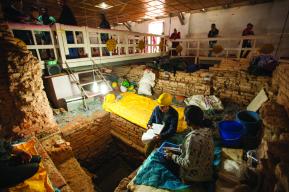Since its outbreak in Palestine early March, the coronavirus pandemic pushed the Palestinian Authority to announce a State of Emergency and impose an overall lockdown, resulting in restraining all glimpses of life. However, the scene along the agricultural terraces in Al Jinan in Battir village is different.
Located a few kilometers south-west of Jerusalem, Battir village is part of the World Heritage Site “Palestine: Land of Olives and Vines – Cultural Landscape of Southern Jerusalem, Battir”. It was inscribed in 2014, and is renowned for its complex irrigation system that is distributed along a series of drystone wall agricultural terraces believed to have been cultivated since antiquity.
Al Jinan (الجِنان), that literally means ‘the gardens’ in Arabic, is a terraced hillside extending from the Old Town of Battir and its main water spring towards the vale through which the old railway connecting Jerusalem to Jaffa still passes today. This terraced valley is the Site’s masterpiece, and is historically known for its irrigated vegetables that were sold at the railway station and in Jerusalem up until the late 1940s, when the Battiri farmers started to consider the markets inside the city of Bethlehem as a more convenient selling point.
Over time, and due to socio-economic changes in the Palestinian society, the agriculture practices in Palestine witnessed a general decline as people depended more on other sectors as a source of living, and so has been the case of Battir. On the other hand, and since the inscription of the site on UNESCO’s World Heritage List, tourism flourished and became another important anchor of economic sustainability and development for several families in the village. Interestingly enough, the largest waves of tourists visit the agricultural landscapes of Battir during springtime; a rich season for plantation and cultivation, which this year coincided with the outbreak of COVID-19 that brought the tourism season to an unprecedented low level due to restricted movement and travels.
In the eyes of the villagers, however, the pandemic is a double-edged sword, where the people in Battir took advantage of the confinement and went back to the land, especially in Al Jinan area and other irrigated terraces around the site, determined to keep it well maintained, clean, cultivated and green.
During these hard times, the people in Battir turned the COVID-19 confinement into a golden opportunity for the conservation of their natural resources, and utilization of their neglected agricultural plots in the World Heritage Terraces. According to the World Heritage Committee, these are the optimal recommended practices that will allow the site to be conserved and managed properly. Reviving agricultural practices along the terraces in Battir does also contribute to raising awareness among the young villagers on the importance of the continuity of agriculture as a vital pillar of sustainability in that area.









